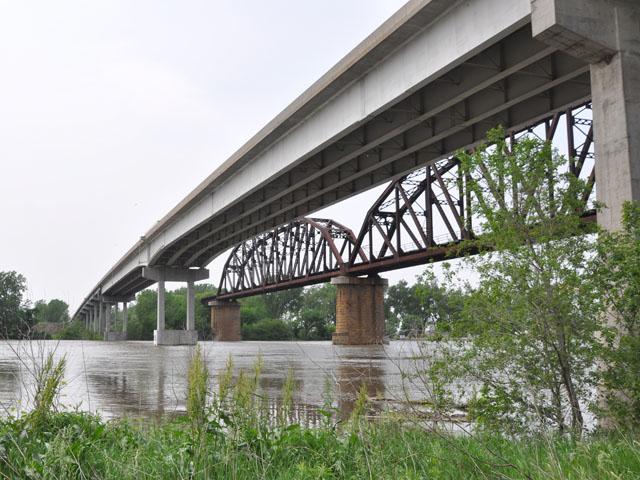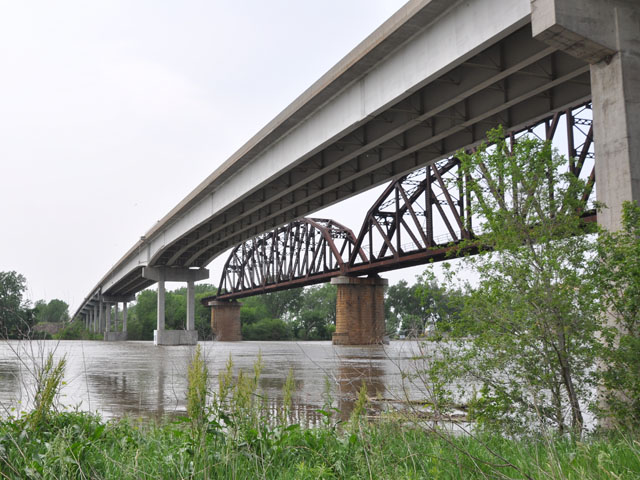Ag Policy Blog
House Passes $1.2 Trillion Infrastructure Package, Giving President Biden a Legislative Win
OMAHA (DTN) -- With a bipartisan vote on infrastructure, the House of Representatives gave final passage to a key part of President Joe Biden's agenda by approving a wide-ranging $1.2 trillion package to rebuild the country's roads, bridges and waterways, the Infrastructure Investment and Jobs Act.
The bill passed 228 to 206 with 13 Republicans joining 215 Democrats to pass the bill. Six Democrats joined 200 Republicans to oppose the bill. The Senate had already passed the infrastructure bill with a bipartisan 69-30 vote back in August, and the House made no changes to the bill written by the Senate.
The bill will provide one of the largest increases in investment in roads, bridges, waterways and electric infrastructure in history.
The final vote on the infrastructure bill came after a day of negotiations among Democrats in Congress and the president. The agreement to shore up Democratic votes for the infrastructure bill also allowed the president's $1.75 trillion social spending package to advance in the House as well, though not yet to a final vote.
INFRASTRUCTURE DETAILS
The bill will increase infrastructure spending by a projected $550 billion over ten years. That includes $110 billion for roads, including $40 billion for bridge projects. Another $55 billion will go toward various water projects. Another $66 billion will go towards rail.
Importantly for rural America, the bill also includes $65 billion to build out broadband infrastructure nationally.
With port congestion now a national priority, the bill also increases funds for ports and inland waters by $17.3 billion. Those funds should help upgrade locks and dams along the Mississippi River, which is the main waterway for corn and soybean exports through the southern Louisiana ports.
Among the road provisions, the bill includes the Rural Surface Transportation grant program, which authorizes $2 billion over five years. A separate bridge restoration fund would spend $3.26 billion over five years. Certain rural areas will see federal government match on community projects to as much as 90%.
For electric infrastructure upgrades in rural America, as much as $1 billion is authorized to help improve the electric grid in towns or unincorporated areas with 10,000 people or fewer. Another $1 billion is set aside for rural water grants as well.
P[L1] D[0x0] M[300x250] OOP[F] ADUNIT[] T[]
The bill includes $7.5 billion for electric charging stations, which is just smaller than what Biden had proposed earlier in the spring. Biden originally wanted to build out 500,000 charging stations nationally.
Written during this year's drought, western senators also includes tens of billions of dollars for water projects, such upgrading and expanding Bureau of Reclamation dam and canal projects. The bill includes $50 billion for various water infrastructure restoration, resilience, and reclamation, including major investments in water infrastructure.
Funds will go to address aging infrastructure such as major rehabilitation and replacement, as well as provide grants to construct smaller surface water and groundwater storage projects. At least $1 billion will go for water recycling and reuse. Another $1 billion will fund water projects in rural communities.
Another $500 million for the U.S. Department of Agriculture Natural Resources Conservation Service Watershed and Flood Prevention Operations (PL-566 projects) to help reduce the project backlog. DTN had highlighted in June how the USDA watershed program addresses both drought and flood risk in rural areas, as well as expanding rural drinking water supplies.
At least $400 million will go toward a "waterSMART" grant program, and another $300 million will help implement the Colorado Drought Contingency Plan, including $50 million specifically for the Upper Basin.
Another $8.58 billion in the bill goes for carbon capture projects, including $2.5 billion for the Department of Energy to develop commercial scale projects.
Livestock and trucking groups had backed language in the bill such as the Haulers of Agriculture and Livestock (HAULS) Act, which would allow livestock haulers to bypass normal trucking hours-of service limitation if the hauler is within 150 miles of their final destination.
HOUSE DRAMA
The House vote late Friday evening came after a day of drama in the House with multiple votes held open for several hours.
Democrats negotiated among themselves over agreements to voted for final passage to the infrastructure bill tying that vote to assurances between moderates and progressives that they will support a final vote on the president's social spending bill, the $1.75 trillion Build Back Better Act, which will only pass if nearly every Democrat is on board. A five-hour procedural vote was held up for hours waiting for roughly 30 Democrats to vote for the resolution. That vote allowed arguments to move ahead over the debate rule. The daylong procedural moves will allow the House to eventually hold a final floor debate and vote on the Build Back Better Act. That vote now likely will not happen until the week of Nov. 15.
A handful of moderate Democrats committed to voting on the Build Back Better Act after receiving a budget score from the Congressional Budget Office, or no later than the week of Nov. 15th. They will vote on a bill "consistent with toplines for revenues and investments" released by the White House on Nov. 4. If the budget score from the CBO is inconsistent with the White House numbers, the moderate Democrats stated, "we remain committed to working to resolve any discrepancies in order to pass the Build Back Better legislation."
Those moderates include Reps. Ed Case of Hawaii, Josh Gottheimer of New Jersey, Stephanie Murphy of Florida, Kathleen Rice of New York and Kurt Schrader of Oregon.
Rep. Pramila Jayapal, D-Wash., chair of the Congressional Progressive Caucus, said her members had reached an agreement to advance both bills. After the moderates had committed to voting for the reconciliation bill, the progressives had agreed to vote for the rule that advances the Build Back Better Act, and the infrastructure bill.
Chris Clayton can be reached at Chris.Clayton@dtn.com
Follow him on Twitter @ChrisClaytonDTN
(c) Copyright 2021 DTN, LLC. All rights reserved.






Comments
To comment, please Log In or Join our Community .